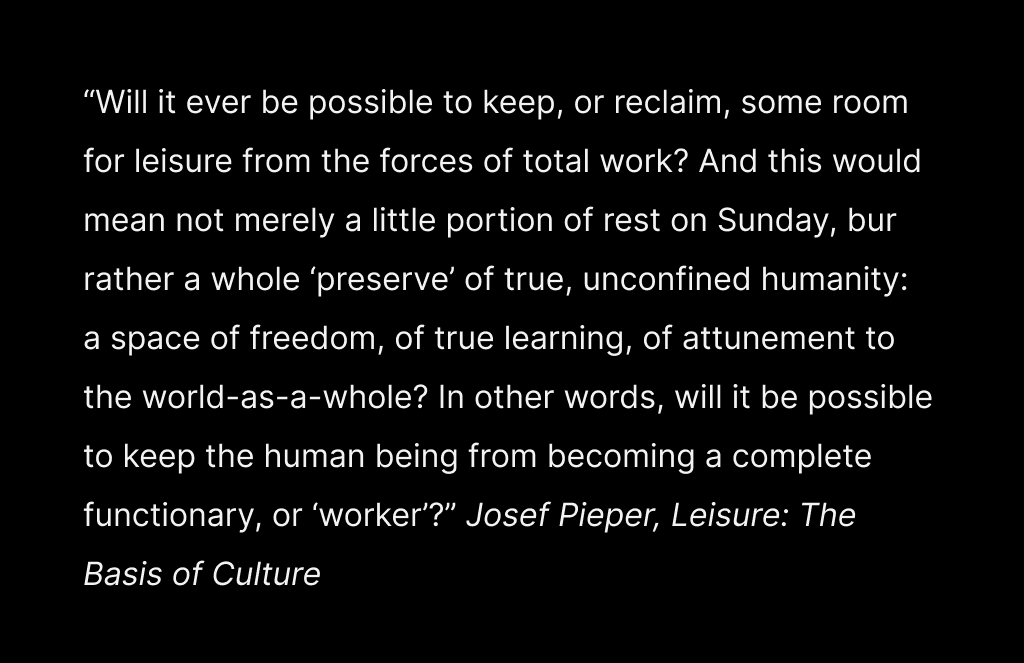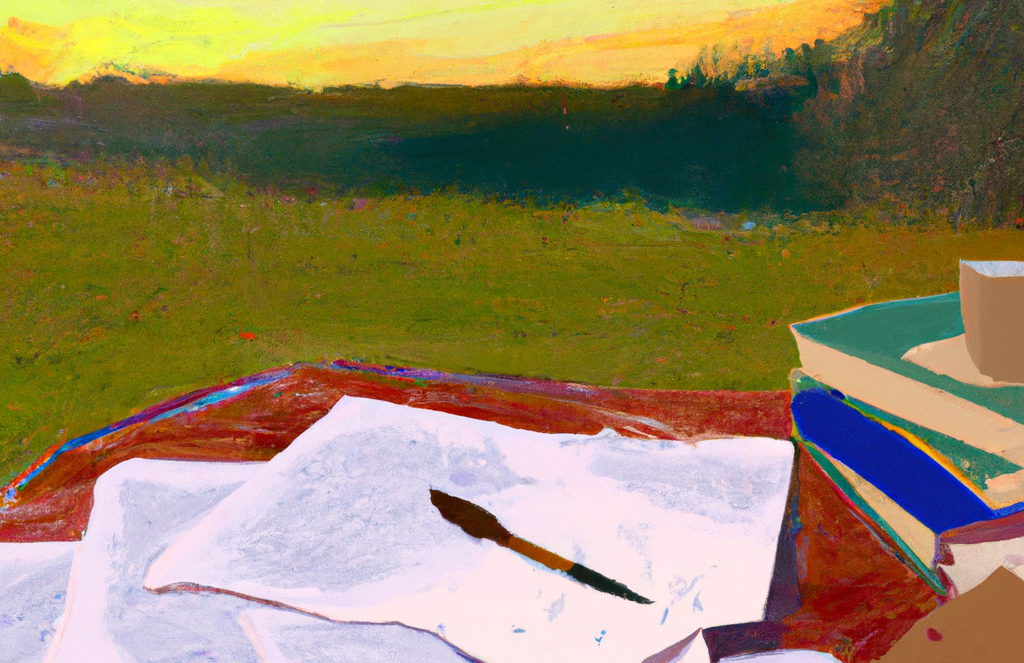A ‘vita contemplativa’ in the age of creativity
How do we want to live our lives? Is the 40h+ work week the axiom we want to inscribe in stone? Or could we imagine an alternative where the vita contemplativa is the norm rather than the anomaly?
No Time to Think
Some weeks ago, Jonathan sent me this paper written by David Levy called No Time to Think. I was mid-fundraise and watched the video version on 1.5x speed while chopping vegetables and peeling potatoes. To put it very simply, Levy argues that our accelerating pace of life is reducing our time for thoughtful reflection. This is happening at the very moment when people have gained access to digital tools that provide significant value to scholarship. His ideas and eloquent ways of connecting them resonated with me deeply (and the irony of multi-tasking through it did not escape me!).
I took a week of “total leisure” recently. My partner and I went to my grandmother’s house in Finnish Lapland. The aim was to rest: to let our minds wander and bodies recharge. I had very little expectation in my ability to detach from work, but I wanted to take the exploration of leisure seriously. On the way over, I re-read Levy’s paper. He references the German philosopher Josef Pieper’s book, Leisure: The Basis of Culture, and I felt it to be perfectly fitting to take it up as a reading project during this week of rest.
Intellect vs. Intellectus
One of the ideas Pieper presents in his book is the juxtaposition between ratio and intellectus. He notes that the Middle Ages saw a distinction in human knowledge between ratio: ‘the power of discursive, logical thought, of searching and examination, of abstraction, of definition and drawing conclusions’, and intellectus: the more contemplative vision, ‘the understanding in so far as it is the capacity of simplex intuitus, of that simple vision to which truth offers itself like a landscape to the eye’. In other words, ratio (or intellect) could be described as the productive, progress-seeking element of human intelligence, whereas intellectus could be seen as its more spiritual and creative counterpart.
During my week of “total leisure” I thought a lot about what it means to work and what it means to have leisure. I walked, hiked, read, cooked, played cards, and heated the sauna. Because of this abundance of unscheduled time, I ended up spending several hours a day just reading, thinking, and writing. This activity didn’t have an end purpose or a goal. I was simply following my desires and curiosities, and seeing where it led me. Along with what I reference in this essay, I dug into ‘The Beginning of Infinity’ by David Deutsch and a book on meditation. I also fell down internet rabbit holes ranging from Aristotle’s Metaphysics to supernovae. For me, leisure equated to the idea of open exploration or the lack of an objective. I wanted to learn, but I didn’t feel the pressure of those learnings needing to convert into something. I felt more driven by the intellectus than intellect, although the irony (or beauty) of this was, of course, its eventual transmutation from the former into the latter.
Being still — open to the ‘contemplative vision of the intellectus, which is not active but passive, or rather receptive, the activity of the soul in which it conceives that which it sees’, as Pieper puts it — is not easy. He continues to note that even the philosophers of antiquity saw the active effort of discursive thought as the properly human element in our knowledge (ratio), and regarded the intellectus to be ‘beyond the sphere allotted to man’. Thomas Aquinas calls the vita contemplativa ‘not really human but superhuman, although it is the noblest mode of human life’.
The Essence of Being Human
I spend a lot of time thinking about the future of humanity, what our societies will look like in the short and long-term future, and what it really means to be human. Pieper argues that the original concept of leisure, which translates to skole in Greek and scola in Latin and relates to the place where we educate and teach (today’s word for school), has become entirely unrecognisable ‘in the world of planned diligence and “total labour”’. We exist to work — to feel accomplished, alive, a part of the world. To work is what it means to be human.
I see potential to redefine the essence of life. To reject the notion that ‘one does not work to live; one lives to work’, as Max Weber put it in his study of capitalism. The rapid development of AI and other technologies generates a window of opportunity to reflect on our role as human beings. How do we want to live our lives? Is the 40h+ work week the law of human nature we want to inscribe in stone? Or could we imagine an alternative where the vita contemplativa is the norm rather than the anomaly? Cyborgs aside, could this be where we — in Aquinas’ terms — transcend from human to superhuman, using technology, creativity, and spirituality as the primary instruments for this social change?
The Age of Creativity
In his paper, David Levy asks the question: where does one get the time to look and to think? Creativity, according to Levy, is a slow time activity that cannot be rushed. Referencing Eriksen in The Tyranny of the Moment, he speaks of fast time vs slow time. When fast and slow time meet, fast time wins. When efficiency becomes the only value in economics, politics, and research, it does so to the detriment of other valuable things in life; contemplative thinking, creativity, play, even love. Creative thought cannot be manufactured, but it can be nurtured. We can generate conditions to quiet our minds, let inspiration flow, and prioritise creativity over productivity.
The technology industry has been very good at increasing productivity. We have created tools to automate, optimise, and delegate menial tasks in order to free our focus towards more important, higher-order missions. But even so, I don’t believe we’re off the productivity hamster wheel. One individual person can certainly accomplish more by managing a suite of tools and mechanisms that increase their efficiency, but how much of their time is dedicated to this administration as opposed to open, contemplative time to think?
I think about the future of work as the future of creativity. Scott Belsky writes about this in his essay Creativity Is the New Productivity, by saying ‘productivity is about squeezing all the value out of existing resources, creativity and creative thinking are about discovering new resources’. This transition from a productivity mindset to one of creativity is not just a possibility, but a necessity, to create more lasting value — for ourselves as human beings to live more joyful, intellectually and spiritually enriching lives, but also for the sake of innovation and societal development. The tools and platforms we use to think, create, and discover ideas can play such a pivotal role in this. I’m excited about building a more creative and authentic internet. One that enables us to play, contemplate, and self-express. An internet for the intellectus!








wonderfully put. there is much to say about rest and leisure as a new form of radical activism that protests against the obsession with “doing, speed, and productivity”. so many opportunities to let go of fixed notions and come back home to who we truly are.